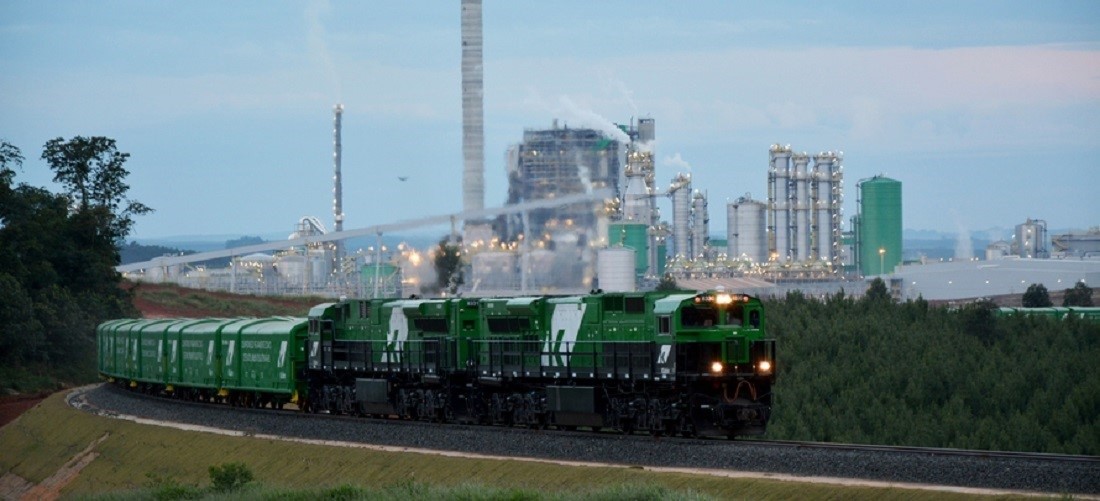
Transportation of pulp via rail to Paranaguá up 26%
Mar, 31, 2021 Posted by Ruth HollardWeek 202114
The volume of pulp that arrives by rail to unload at the Port of Paranaguá has increased by 26% in the first two months, year-on-year. During the period, 2,414 wagons carried 154,464 tons. In the same two-month period in 2020, 1,918 wagons delivered 122,752 tons of the product to be exported.
“The railway modal is being used more and more to transport cargo to the ports of Paraná and is increasing in all segments, not only in general cargo. One of our main objectives is to further increase the volume of products unloading from wagons”, comments Luiz Fernando Garcia, president of the company Portos do Paraná.
The pulp exported through the Port of Paranaguá is produced at Klabin’s Puma Unit, in the municipality of Ortigueira, in the Campos Gerais region. According to the company, in these first two months, 137,000 tons of pulp were exported through the Port of Paraná – 104,000 tons by breakbulk (76%) and 33,000 tons by container vessel (34%). Europe and Asia are the main destinations for the product.
In addition to bales of pulp, Klabin also exports paper on reels, both via breakbulk and containers, through the Port of Paranaguá. The volume of paper volume handled by the company in this two-month period was 30,000 tons.
According to Sandro Ávila, Director of Operational Planning, Logistics and Supplies at Klabin, 73% of the total volume of products exported by Port of Paranaguá was transported by rail. “However, 90% of the pulp in bales was transported to Paranaguá by rail,” he says.
“There are many variables of the operation that determine the use of the modes, so it is difficult to specify a single reason for this increase. We can say that the main guide is the programming of the breakbulk or container vessels; from there we plan the loads and modes”, explains Ávila.
New Klabin Terminal – The expectation is that the movement of pulp through the Port of Paranaguá will be even greater when the new Klabin terminal is installed and operating in the primary area. The company received the installation license at the end of 2020 and held a public hearing in early March to present the Neighborhood Impact Study.
According to Ávila, the virtual audience was broadcast in real-time and counted on the participation and contribution of several sectors. “We presented the project to build a walkway on Avenida Portuária, at the main railway crossing point and long-awaited by the population, as it is also the crossing point for individual port workers to access the port,” he says.
The walkway will benefit around 2,800 workers per day and, in addition to improving and speeding up the flow of pedestrians, it will increase the safety of these professionals on the access route to the port.
After the public hearing held on March 3, the company remains in a 30-day regulatory period for the issuance of the construction permit for the new terminal. “Once we receive that, we should be able to start the works respecting the decrees related to the pandemic. The work is expected to last 15 months”, assures the Klabin representative.
1.2 million tons/year – Named PAR1, Klabin’s new terminal area in the Port of Paranaguá will measure 27,530 m2 with road and rail connections and, after the investments, it will reach be able to handle 1.2 million tons per year. The estimate is that the new warehouse area will total 15,000 m2 dedicated to storage and 6600 m2 for the allocation of railway branches, totaling approximately 21,600 m2 – not to mention the area for forklift maneuvers.
Klabin, the largest producer and exporter of packaging paper in Brazil, will manage a terminal for handling general cargo, especially pulp. The area’s development contract has a term of 25 years (extendable for another 45 years). The company intends to invest R$ 130 million in the area and generate income and more work for the region from the very beginning of the construction.
-
Trade Regulations
Apr, 24, 2023
0
Brazil eyes signing Mercosur-EU agreement this year, says Ministry secretary
-
Ports and Terminals
Oct, 19, 2022
0
Port of Paranagua bulk exports to total 6.6m tonnes by December
-
Apr, 25, 2023
0
Brazil’s largest port embraces drone use to improve operations safety
-
Other Logistics
Mar, 23, 2021
0
Centro-Atlântica railway terminals handle 25 mi tons of agribusiness cargo


